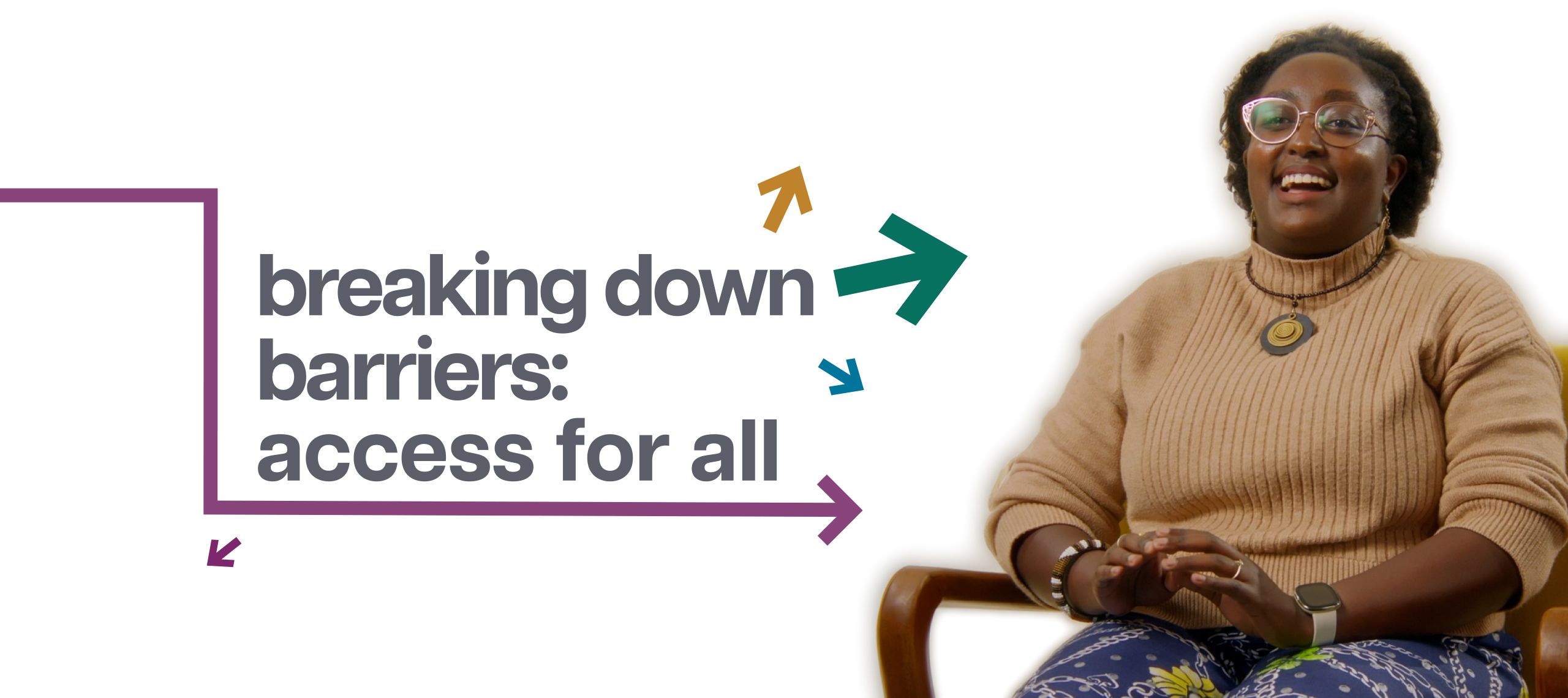
Research Journeys: Breaking down barriers: Access for all
In identifying the barriers to disability rights implementation we can begin to understand why and how some services are accessible to some, but not others.
Damarie's passion for championing disability rights comes from both her academic and personal life. Her research is dedicated to unravelling the web of access challenges disabled people and their families experience in Kenya- her home country.
Damarie is investigating the outdated colonial policies that still impact disabled communities. She not only wants to help understand the complex issues but contribute to improving disability rights.
This Research Journey is part of a collection made with members of the 100 Black Women Professors NOW network.
Browse stories from the collection.
Transcript
[Damarie is sitting in front of a white background speaking directly to camera.]
Damarie: So I remember when the wheelchair showed up in the corridor of our home. Well, I don't remember its arrival. I just remember it being there like it always had been. It was motorised and it had black and orange cushioning. It wasn't the first time I had seen a wheelchair. My mum, the user of this new fancy device in our home, spent most of her weekends volunteering with charity and aid organisations, sometimes distributing wheelchairs to the less fortunate. So when she gradually lost her mobility due to her medical condition, this was an easy next step for us, right?
Now, I'd like to point out my privilege here because this fancy wheelchair, as I said, it arrived. It was important. My family had the means and the networks to do so. And if I actually think about it now, any device, you name it, from stairlifts to eye trackers, we were able to get it for her.
So throughout my undergraduate studies, my family pivoted to this new but familiar reality. And I was fortunate enough to be surrounded by communities of care. This allowed me to continue my education abroad while my mum was being cared for back in Kenya. But as you can imagine, with something this emotionally taxing, I struggled with university. I remember struggling with some of my modules, my concentration and my motivation. And as her condition got worse, I became disenchanted with higher education. I mean, what was it all for?
And so when I sat in my first disability law lecture, in my third year of my undergraduate law degree, I was struck by how I resonated so much with its content. And through this module, I began to articulate and use the language of rights to describe what my mum and my family was going through. Because of this one module, I decided to continue with a master's in international human rights law. And I still volunteered where I could through the university.
So as a welfare rights volunteer, I worked with disabled people, helping them fill in their personal independent payment claim forms, PIP, yeah. So they could get assistance from the government to cope with extra living costs.
Around this time, I was also engaged with the research my professors and my lecturers were looking at. So I was a research assistant for the CEREBRA Legal Entitlements and Problem Solving Project, which is like long. But basically in this research project, we worked on research with and about families of disabled children in the UK who struggle to access social care and health services that public bodies have a duty to provide. At this time, I was also another research assistant for my international law professor, who was looking at how we could decolonise the international law curriculum. So de-centering Eurocentric ideas about certain concepts in the field.
And all this came together when I began to think about my research proposal. I like to think about it as a combination of my personal experience and my academic journey. So I began to think about the barriers to disability rights implementation in Kenya. Kenya, this post-colonial state I call home. On one hand, we have these beautiful laws and policies striving towards international standards, such as the UN Convention on the Rights of Persons with Disabilities. And on the other, a very stark reality.
So I look at colonial welfare ideologies and policies that existed before Kenya got independence and sort of explore how they might have something to do with the care for people with disabilities in Kenya today. I also explore ideologies and structures, education and health institutions and how people with disabilities and their families interact with them.
As part of my field work, I interviewed caregivers of children with disabilities in low-income settlements in Nairobi. Basically had chats with them about what it meant to seek education for their children, seek healthcare, face discrimination on transport every day in their care journeys. In one instance, I interviewed this phenomenal caregiver, a mother, Winnie, not her real name. Winnie lived in one of the largest informal settlements in Africa, Kibera, which was just a short drive from the greeny, leafy suburb I grew up in.
Winnie used to carry her child to school on her back. Now, when I interviewed her, her 17-year-old daughter hadn't been to school for over five years. You see, in the context of these beautiful laws and policies, of the various charity and aid organisations working on disability issues in the same informal settlement, in this fragmented context, Winnie couldn't access a wheelchair to take her child to school.
So through my research, I'm hoping in identifying the barriers to disability rights implementation in a postcolonial context, we can begin to understand why and how some services are accessible to some people, but not others. Why my mum could import a motorised wheelchair, but Winnie had no access to the same wheelchairs my mum was distributing with her friends over the weekends.